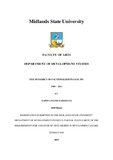Please use this identifier to cite or link to this item:
https://cris.library.msu.ac.zw//handle/11408/3984Full metadata record
| DC Field | Value | Language |
|---|---|---|
| dc.contributor.author | Sisimayi, Tapiwa Patson | - |
| dc.date.accessioned | 2020-12-09T09:02:58Z | - |
| dc.date.available | 2020-12-09T09:02:58Z | - |
| dc.date.issued | 2019 | - |
| dc.identifier.uri | http://hdl.handle.net/11408/3984 | - |
| dc.description.abstract | This study is a critical examination of the dynamics of factionalism in ZANU-PF between 1980 and 2017, with the goal of identifying how factionalism has impacted on the national development agenda. This qualitative research drew data from the analysis of documents and from oral unstructured interviews. The specific aim of the study is to analyse why Zimbabwe has failed to develop for the past 37 years despite being led by a socialist revolutionary party which is ideologically informed by the modernization concept. The research’s central hypothesis is, factionalism is largely to blame for Zimbabwe’s economic woes that engulfed the nation for the past 3 and half decades robbing the nation of the opportunity to develop. Factionalism has resulted in corruption, civil unrest, policy paralysis, abuse of human rights and contempt of law as factions fought to take charge of both party and government. This has produced tribal/regional politics, exclusionary politics, politics of patronage and fragmentation and vulnerability. The study also highlights that factionalism is not always undesirable as it has a positive side which leads to the formulation of an important contribution to the country’ s politics by encouraging debate on the contentious succession issue. It also illumed the need for generational change considering that Zimbabwe is a nation with an entire generation struggling for the past 37 years to formulate an important contribution to the country’ s politics. Theoretically, the study deploys realism perspective aided by game theory as it fights to unmasks and to illumine the causes and dynamics of factionalism in ZANU-PF. Finally, this dissertation concludes by encouraging ZANU-PF to democratize, embrace and manage factionalism for the achievement of national development since what happens in ZANU-PF directly affects activities in government. | en_US |
| dc.language.iso | en | en_US |
| dc.publisher | Midlands State University | en_US |
| dc.subject | factionalism | en_US |
| dc.subject | ZANUPF | en_US |
| dc.subject | 1980 - 2017 | en_US |
| dc.subject | development | en_US |
| dc.title | The dynamics of factionalism in ZANUPF : 1980 – 2017 | en_US |
| dc.type | Thesis | en_US |
| item.cerifentitytype | Publications | - |
| item.openairetype | Thesis | - |
| item.fulltext | With Fulltext | - |
| item.grantfulltext | open | - |
| item.languageiso639-1 | en | - |
| item.openairecristype | http://purl.org/coar/resource_type/c_18cf | - |
| Appears in Collections: | Master Of Arts In Development Studies | |
Files in This Item:
| File | Description | Size | Format | |
|---|---|---|---|---|
| Tapiwa Disertation.pdf | Full Text | 1.46 MB | Adobe PDF |  View/Open |
Page view(s)
220
checked on Apr 16, 2025
Download(s)
280
checked on Apr 16, 2025
Google ScholarTM
Check
Items in MSUIR are protected by copyright, with all rights reserved, unless otherwise indicated.



